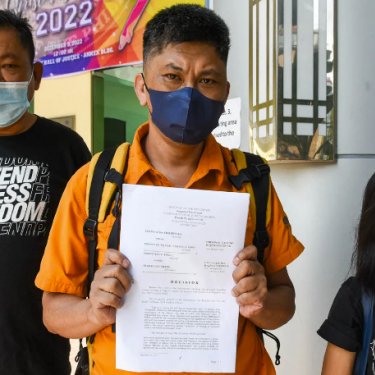Philippines urged to decriminalise defamation after another reporter is sentenced to imprisonment

Reacting to the prison sentence that Philippine reporter Frank Cimatu has received on a cyber-libel charge for an old Facebook post about possible government corruption, Reporters Without Borders (RSF) calls for the proceedings against this journalist to be dropped and, more generally, for the decriminalisation of defamation in the Philippines.
Frank Cimatu could end up serving more than five years in prison for the short, ironic comment he posted on Facebook five years ago, according to the sentence handed down on 13 December by a court in Quezon City, a northern suburb of the capital Manila.
The court sentenced him to between six months and five years, five months and 11 days in prison under a system that allows a sentence implementation judge to decide how long such a sentence lasts in practice. He remains free pending the outcome of the appeal he has said he will file.
He was convicted for commenting about the fact that the registered wealth of then agriculture secretary Emmanuel “Manny” Piñol had increased by 21 million pesos (more than 300,000 euros) at a time when bird flu was sweeping Luzon, the island where Manila is located.
Based in Baguio, a city on Luzon island 240 km north of Manila, Cimatu is a reporter for the Baguio Chronicle newspaper while at the same time contributing to the Manila-based news website Rappler.
Relentless judicial harassment
“However long the sentence lasts in practice, you don’t jail a journalist for a message posted online in good faith,” said Daniel Bastard, the head of RSF’s Asia-Pacific desk. “We demand the end of these absurd proceedings against Frank Cimatu and we urge Philippine legislators to decriminalise defamation. This case is evidence – if any was needed – that the laws criminalising defamation in the Philippines are used to intimidate reporters critical of the government."
Rappler co-founder and CEO Maria Ressa was herself convicted of cyber-libel by a Manila court on 15 June 2020. Awarded the Nobel Peace Prize in 2021, she was subjected to relentless judicial harassment by government agencies during Rodrigo Duterte’s six-year presidency, which ended in June.
All of the charges still pending against her under the current administration could potentially result in a combined sentence of nearly 100 years in prison.
The type of judicial harassment to which Philippine journalists are subjected is one of the reasons why the Philippines is now ranked as low as 147th out of 180 countries in RSF's World Press Freedom Index.
